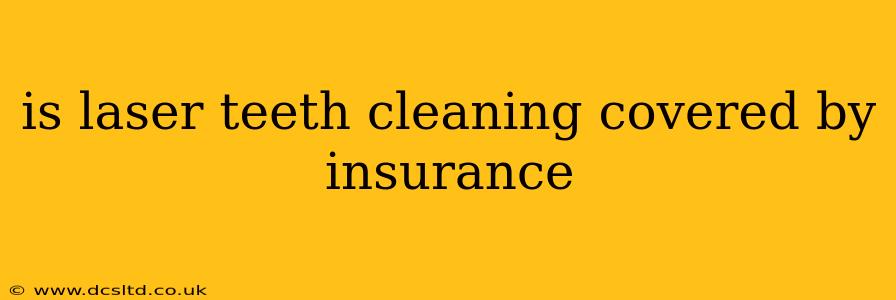Is Laser Teeth Cleaning Covered by Insurance?
The short answer is: it depends. Whether your insurance covers laser teeth cleaning depends on several factors, including your specific insurance plan, your dentist's billing practices, and even the type of laser cleaning performed. While some insurance companies are starting to recognize laser cleaning as a comparable alternative to traditional methods, many still don't explicitly cover it. Let's delve into the specifics.
What is Laser Teeth Cleaning?
Laser teeth cleaning, also known as laser scaling and root planing, uses a laser to remove plaque and tartar buildup from teeth and below the gum line. It's often touted for its potential benefits, such as reduced bleeding, quicker healing times, and potentially less discomfort compared to traditional methods. However, the procedure is not universally accepted as a replacement for traditional cleaning.
Does My Insurance Cover Laser Teeth Cleaning as a Routine Cleaning?
This is the most common question, and unfortunately, the answer is usually no. Most dental insurance plans cover routine cleanings (prophylaxis) using traditional methods. These plans typically consider laser cleaning a more advanced or elective procedure, placing it outside the scope of standard coverage.
When Might My Insurance Cover Laser Teeth Cleaning?
There are some instances where your insurance might contribute towards the cost:
- Medical Necessity: If your dentist deems laser cleaning medically necessary due to severe periodontal disease or other specific conditions, your insurance might cover all or part of the cost. This requires proper documentation and justification from your dentist. They need to demonstrate that traditional methods are insufficient for your specific needs.
- Specific Policy Coverage: Although rare, some comprehensive dental insurance plans might include coverage for laser cleaning under certain circumstances. Carefully review your policy documents or contact your insurance provider directly to understand the specifics of your coverage. Look for any wording that mentions advanced periodontal procedures or laser dentistry.
What are the Costs Involved in Laser Teeth Cleaning?
The cost of laser teeth cleaning varies widely depending on several factors including the dentist’s location, the extent of the procedure, and the type of laser used. It's often more expensive than traditional methods. Getting a detailed cost breakdown from your dentist before the procedure is crucial.
How Can I Find Out if My Insurance Covers Laser Teeth Cleaning?
The best way to determine coverage is to:
- Check your policy documents: Thoroughly review your dental insurance policy for any specific details about laser cleaning or advanced periodontal treatments.
- Contact your insurance provider: Call the customer service number on your insurance card and ask specifically about coverage for laser teeth cleaning. Provide them with the procedure code your dentist would use for billing.
- Ask your dentist: Your dentist is the most informed party to advise you. They understand the specific procedures they use and can check with your insurance company on your behalf to obtain pre-authorization. This pre-authorization helps determine coverage before the procedure, reducing surprises later.
Are There Alternatives to Laser Teeth Cleaning?
Yes, traditional scaling and root planing remain a highly effective method for removing plaque and tartar and are generally covered by insurance. Discuss the pros and cons of each approach with your dentist to determine the best course of action based on your individual needs and your insurance coverage.
In conclusion, while the benefits of laser teeth cleaning are compelling, its coverage under dental insurance remains unpredictable. Always verify coverage with your provider and dentist before proceeding to avoid unexpected out-of-pocket expenses. Understanding your specific policy and the medical necessity for the procedure will be critical in determining your out-of-pocket costs.
